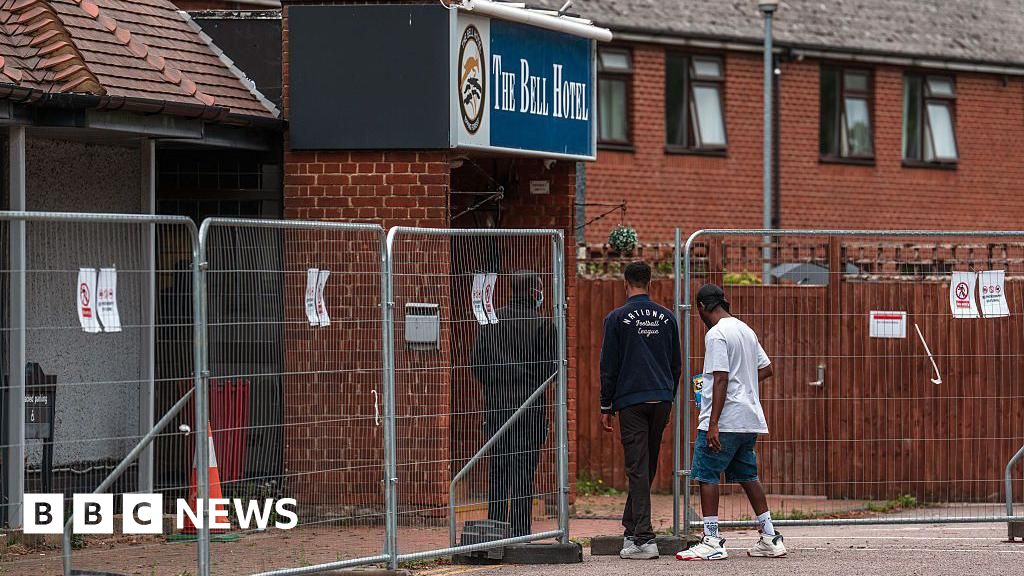Business
Home Office ‘squandered billions’ on asylum accommodation, MPs say

The Home Office has “squandered” billions of pounds of taxpayers’ money on asylum accommodation, according to a report by a committee of MPs.
The Home Affairs Committee said “flawed contracts” and “incompetent delivery” left the department unable to cope with a surge in demand and it relied on hotels as “go-to solutions” instead of temporary stop-gaps.
The MPs said expected costs had tripled to more than £15bn and not enough had been done to recoup excess profits.
A Home Office spokesperson said the government was “furious about the number of illegal migrants in this country and in hotels”, and reiterated its pledge to end the use of asylum hotels by 2029.
Around 32,000 asylum seekers are currently living in 210 hotels whilst their applications are processed, costing the government around £5.5m a day.
The report said the current system for housing people seeking asylum – with its reliance on hotels – was expensive, unpopular with local communities and unsuitable for the asylum seekers themselves.
The report said the contracts drawn up for accommodation providers under the Conservatives had been flawed and that “inadequate oversight” had meant failings went “unnoticed and unaddressed”.
Expected costs for hotel contracts from 2019-2029 have risen from £4.5bn to £15.3bn, while two accommodation providers still owe millions in excess profits that the Home Office has not recovered, the report found.
Chair of the committee Dame Karen Bradley told BBC Radio 4’s Today programme: “We just ended up with more people than the contracts ever thought there could be and that’s meant that the costs have absolutely rocketed.”
“The government has only just started looking at claiming back those profits, auditing the accounts to see what is due back to the taxpayer,” Dame Karen said.
The said “failures of leadership at a senior level” were among reasons the Home Office was “incapable of getting a grip on the situation”.
Dame Karen said the department had “neglected the day-to-day management of these contracts” and has focused on “short term, reactive responses”.
“The skills needed to manage these contracts simply were not present in the Home Office when they were drawn up,” she added.
External factors, including the pandemic and the “dramatic” increase in small boat arrivals, have meant the Home Office has had to accommodate “a growing number of people for longer periods of time” the report said.
Choices made by the previous Conservative government, including to delay asylum decisions as it pursued the scheme to deport migrants to Rwanda, factored into this, MPs added.
While the report acknowledged the “challenging environment” in which the Home Office was operating, it said “its chaotic response has demonstrated that it has not been up to the challenge”.
The MPs said they had heard too many cases of inadequate asylum accommodation and unaddressed safeguarding concerns for vulnerable people.
Housing Secretary Steve Reed accused the previous government of “pouring taxpayers’ money down the drain”.
He added that Labour ministers were continuing to look at housing asylum seekers on disused military bases, as they are the “least expensive option available”, alongside longer-term rental accommodation options.
Two former military sites – MDP Wethersfield, a former RAF base in Essex, and Napier Barracks, a former military base in Kent – are already being used to house asylum seekers after being opened under the Conservatives.
Dame Karen welcomed the government’s pledge to shift away from asylum hotels and invest in larger sites like military bases.
But she said past failings, like moving people into accommodation too quickly, must not be repeated.
“On large sites, once the lessons have been learned, facilities are much better, people are in much more suitable accommodation and it can be better for everybody,” she said.
In response to the report, a Home Office spokesperson said: “We have already taken action – closing hotels, slashing asylum costs by nearly £1 billion and exploring the use of military bases and disused properties.”
Several protests and counter-protests over asylum hotels have taken place across the UK this year, notably in Epping over the summer after an asylum seeker being housed at The Bell Hotel was charged with two sexual assaults.
Business
Budget 2026: India pushes local industry as global tensions rise

India’s budget focuses on infrastructure and defence spending and tax breaks for data-centre investments.
Source link
Business
New Income Tax Act 2025 to come into effect from April 1, key reliefs announced in Budget 2026

New Delhi: Finance Minister Nirmala Sitharaman on Sunday said that the Income Tax Act 2025 will come into effect from April 1, 2026, and the I-T forms have been redesigned such that ordinary citizens can comply without difficulty for ease of living.
The new measures include exemption on insurance interest awards, nil deduction certificates for small taxpayers, and extension of the ITR filing deadline for non-audit cases to August 31.
Individuals with ITR 1 and ITR 2 will continue to file I-T returns till July 31.
“In July 2024, I announced a comprehensive review of the Income Tax Act 1961. This was completed in record time, and the Income Tax Act 2025 will come into effect from April 1, 2026. The forms have been redesigned such that ordinary citizens can comply without difficulty, for) ease of living,” she said while presenting the Budget 2026-27
In a move that directly eases cash-flow pressure on individuals making overseas payments, the Union Budget announced lower tax collection at source across key categories.
“I propose to reduce the TCS rate on the sale of overseas tour programme packages from the current 5 per cent and 20 per cent to 2 per cent without any stipulation of amount. I propose to reduce the TCS rate for pursuing education and for medical purposes from 5 per cent to 2 per cent,” said Sitharaman.
She clarified withholding on services, adding that “supply of manpower services is proposed to be specifically brought within the ambit of payment contractors for the purpose of TDS to avoid ambiguity”.
“Thus, TDS on these services will be at the rate of either 1 per cent or 2 per cent only,” she mentioned during her Budget speech.
The Budget also proposes a tax holiday for foreign cloud companies using data centres in India till 2047.
Business
Budget 2026 Live Updates: TCS On Overseas Tour Packages Slashed To 2%; TDS On Education LRS Eased

Union Budget 2026 Live Updates: Union Budget 2026 Live Updates: Finance Minister Nirmala Sitharaman is presenting the Union Budget 2026-27 in Parliament, her record ninth budget speech. During her Budget Speech, the FM will detail budgetary allocations and revenue projections for the upcoming financial year 2026-27. Sitharaman is notably dressed in a Kanjeevaram Silk saree, a nod to the traditional weaving sector in poll-bound Tamil Nadu.
The budget comes at a time when there is geopolitical turmoil, economic volatility and trade war. Different sectors are looking to get some support with new measures and relaxations ahead of the budget, especially export-oriented industries, which have borne the brunt of the higher US tariffs being imposed last year by the Trump administration.
On January 29, 2026, Sitharaman tabled the Economic Survey 2025-26, a comprehensive snapshot of the country’s macro-economic situation, in Parliament, setting the stage for the budget and showing the government’s roadmap. The survey projected that India’s economy is expected to grow 6.8%-7.2% in FY27, underscoring resilience even as global economic uncertainty persists.
Budget 2026 Expectations
Expectations across key sectors are taking shape as stakeholders look to the Budget for support that sustains growth, strengthens jobs and eases financial pressures:
Taxpayers & Households: Many taxpayers want practical improvements to the income tax structure that preserve simplicity while supporting long-term financial planning — including broader deductions for home loan interest and diversified retirement savings options.
New Tax Regime vs Old Tax Regime | New Income Tax Rules | Income Tax 2026
Businesses & Industry: With industrial output and investment showing resilience, firms are looking for policies that bolster capital formation, ease compliance, and expand infrastructure spending — especially in manufacturing and technology-driven sectors that promise jobs and exports.
Startups & Innovation: The startup ecosystem expects incentives around employee stock options and capital access, along with regulatory tweaks that encourage risk capital and talent retention without increasing compliance burdens.
Also See: Stock Market Updates Today
The Budget speech will be broadcast live here and on all other news channels. You can also catch all the updates about Budget 2026 on News18.com. News18 will provide detailed live blog updates on the Budget speech, and political, industry, and market reactions.
We are providing a full, detailed coverage of the union budget 2026 here, with a lot of insights, experts’ views and analyses. Stay tuned with us to get latest updates.
Also Read: Budget 2026 Live Streaming
Here are the Live Updates of Union Budget 2026:
-

 Business1 week ago
Business1 week agoSuccess Story: This IITian Failed 17 Times Before Building A ₹40,000 Crore Giant
-

 Fashion1 week ago
Fashion1 week agoSouth Korea tilts sourcing towards China as apparel imports shift
-

 Sports5 days ago
Sports5 days agoPSL 11: Local players’ category renewals unveiled ahead of auction
-

 Sports1 week ago
Sports1 week agoWanted Olympian-turned-fugitive Ryan Wedding in custody, sources say
-

 Tech1 week ago
Tech1 week agoStrap One of Our Favorite Action Cameras to Your Helmet or a Floaty
-

 Entertainment1 week ago
Entertainment1 week agoThree dead after suicide blast targets peace committee leader’s home in DI Khan
-

 Tech1 week ago
Tech1 week agoThis Mega Snowstorm Will Be a Test for the US Supply Chain
-

 Sports1 week ago
Sports1 week agoStorylines shaping the 2025-26 men’s college basketball season





